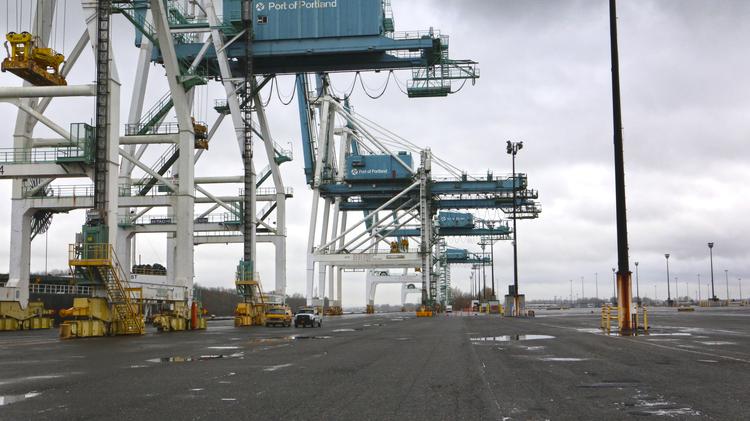forum
library
tutorial
contact

Longshoremen Cited for
Unfair Labor Practices
by Mateusz Perkowski
Capital Press, December 8, 2015
|
the film forum library tutorial contact |

|
Longshoremen Cited for
by Mateusz Perkowski
|
 The longshoremen's union was faulted for unfair labor practices at the Port of Portland, but the restoring container service at the facility will require more nuance.
The longshoremen's union was faulted for unfair labor practices at the Port of Portland, but the restoring container service at the facility will require more nuance.
A federal agency has twice faulted the longshoremen's union for unfair labor practices at the Port of Portland, but such rulings won't directly restore container service at the facility, experts say.
Ocean carriers responsible for the majority of container traffic at the port, Hanjin and Hapag-Lloyd, stopped servicing the facility earlier this year due to low productivity.
The disruption has affected farmers who relied on Portland's container terminal to export crops to Asia and now face higher shipping costs.
The National Labor Relations Board has found that since September 2012, the International Longshore and Warehouse Union operated cranes and trucks in a "slow and nonproductive manner," among other actions, to force ocean carriers and the terminal operator to "cease doing business with the port."
In a previous ruling, the NLRB also found that the union also engaged in earlier work slowdowns and stoppages during a dispute with the terminal operator, ICTSI Oregon.
These findings allow the agency to seek contempt sanctions against the union in federal court.
Capital Press was unable to reach an ILWU spokersperson for comment. Elvis Ganda, CEO of ICTSI Oregon, released a statement saying the union should "accept the validity" of the ruling and agree to restore productivity at the container terminal.
While the terminal operator has prevailed in these NLRB disputes, using these legal victories to actually bring ocean carriers back to Portland is a more complicated matter, experts say.
That's because the NLRB has ruled that ILWU cannot engage in work slowdowns, but there's currently almost no work with which to interfere at the container terminal.
"This is a very unusual scenario when it raises the point of enforcing the law," said Michael LeRoy, a law professor specializing in labor relations at the University of Illinois.
For ICTSI, the NLRB rulings are more likely to serve as bargaining chips in its overall negotiations with the longshoremen's union, LeRoy said.
The union, the port and the container terminal are also engaged in other litigation in federal court.
It's possible that ICTSI will use legal victories as part of a public "tit for tat" with the longshoremen's union but later "wipe the slate clean" so the terminal can again become operational, LeRoy said.
Terminal operators have not traditionally enforced such NLRB rulings to win monetary awards due to fear of creating "lifelong ill will" with the longshoremen's union, said Jim Tessier, a labor relations consultant and former employee of the Pacific Maritime Association, which represents terminals.
"They use it as a negotiating tool," he said.
ICTSI would be wiser to drop the case against the union as a show of good faith rather than press for penalties, Tessier said. "That would mean the kiss of death for that company, in my humble opinion."
Ocean carriers won't return to the port unless they're convinced the union and terminal operator have reconciled, he said.
ICTSI Oregon has a 25-year lease for the container terminal, so unless the company is willing to make amends with ILWU to restore service, it "will have a nice parking lot," Tessier said.
Whether the NLRB is willing to seek financial damages or simply regards the legal victories as symbolic is a "wild card," said LeRoy.
The agency has won major awards in the past, such as a $64 million against a miner's union for staging illegal pickets, he said.
In that case, however, the pickets were directly preventing the movement of trucks, LeRoy said. At the Port of Portland, the agency would have to prove that ILWU's actions drove ocean carriers away.
"That is harder to demonstrate," he said.
Related Sites:
Shipping Report by Port of Porland, 2011 to 2015
learn more on topics covered in the film
see the video
read the script
learn the songs
discussion forum
